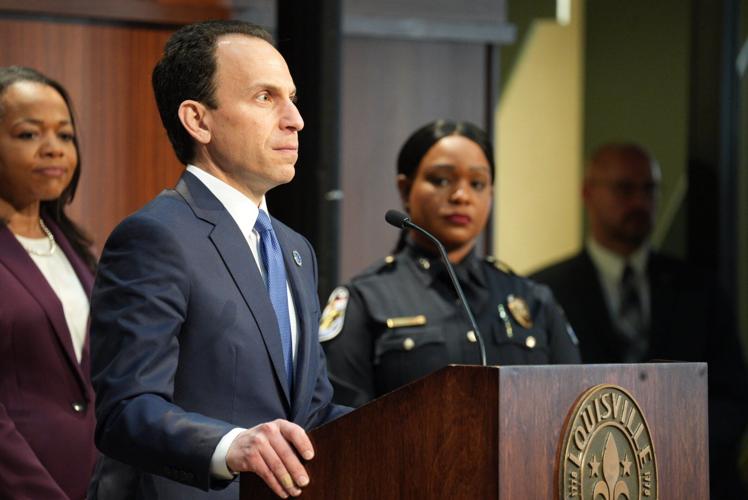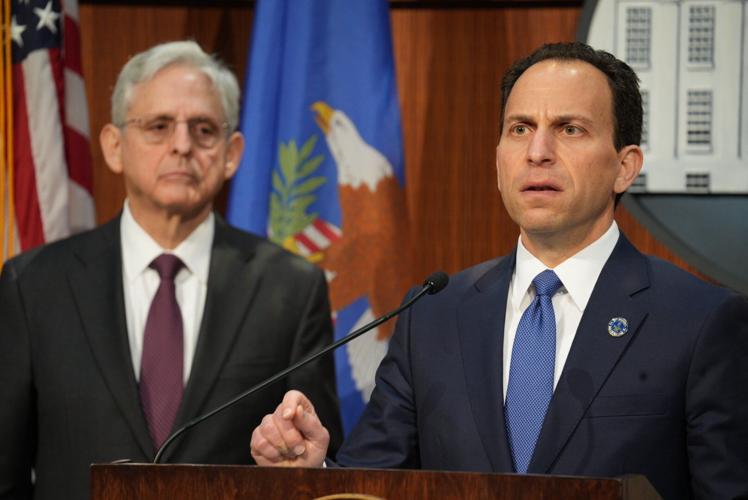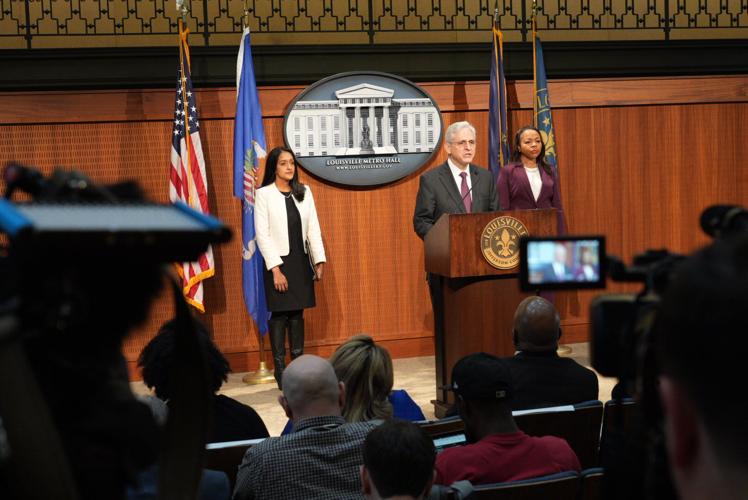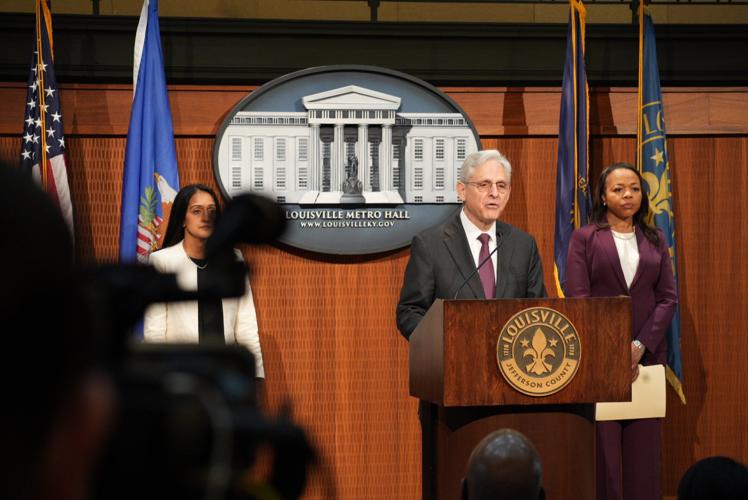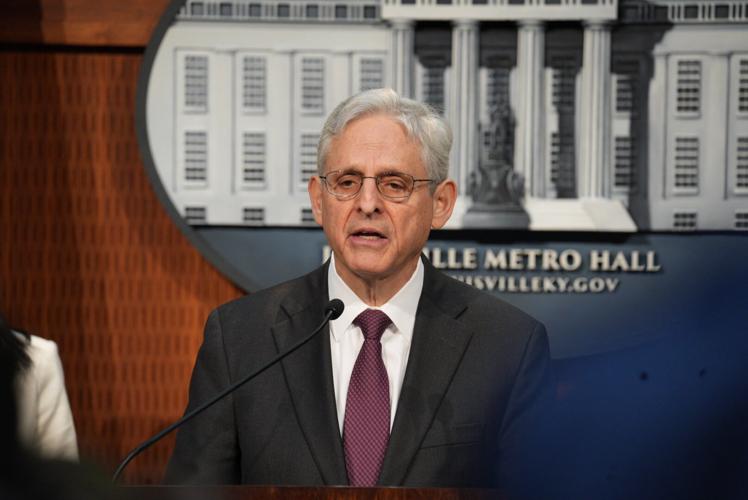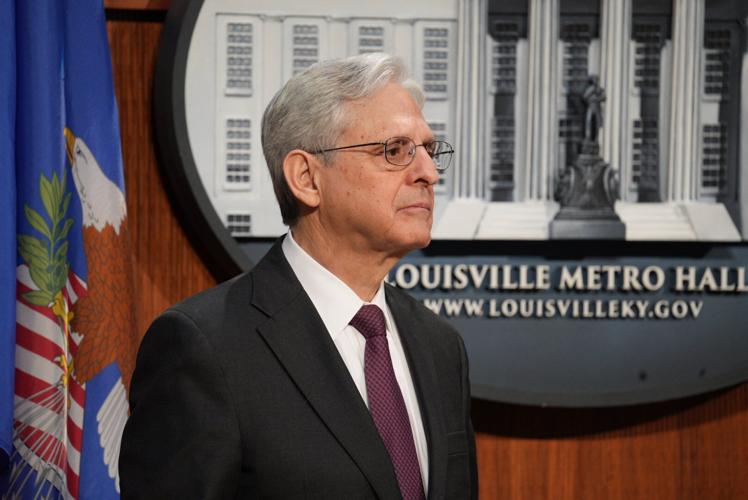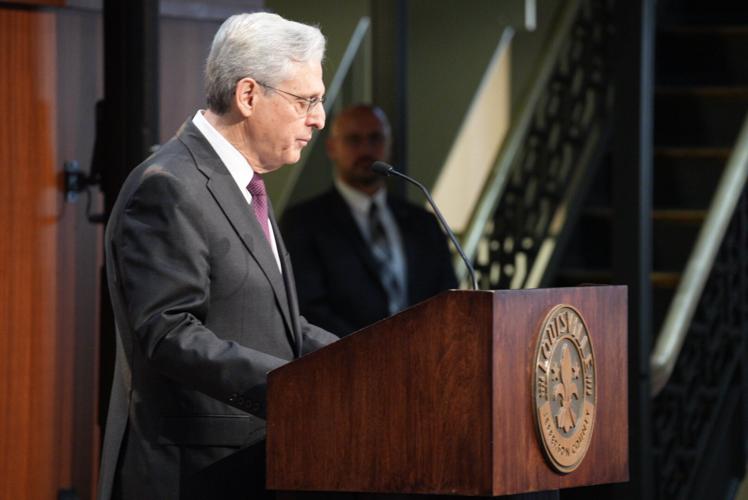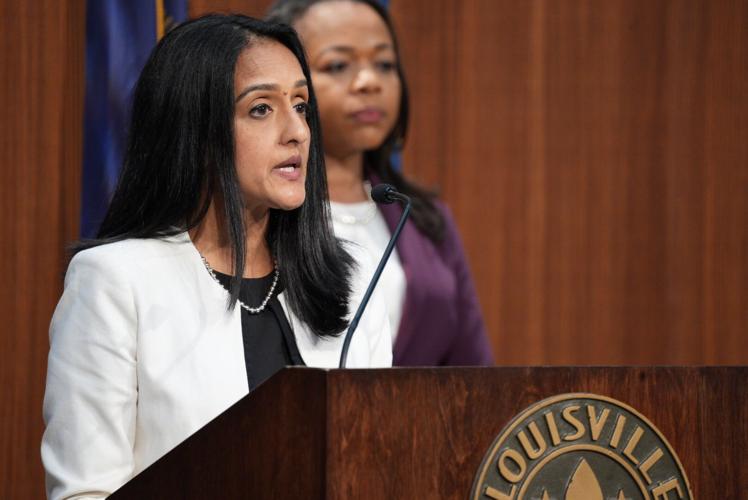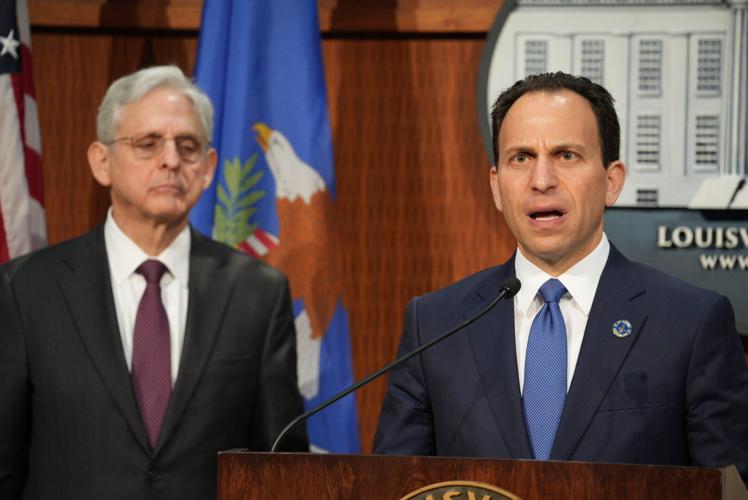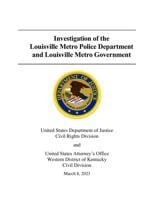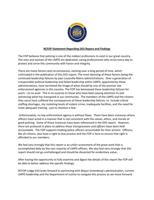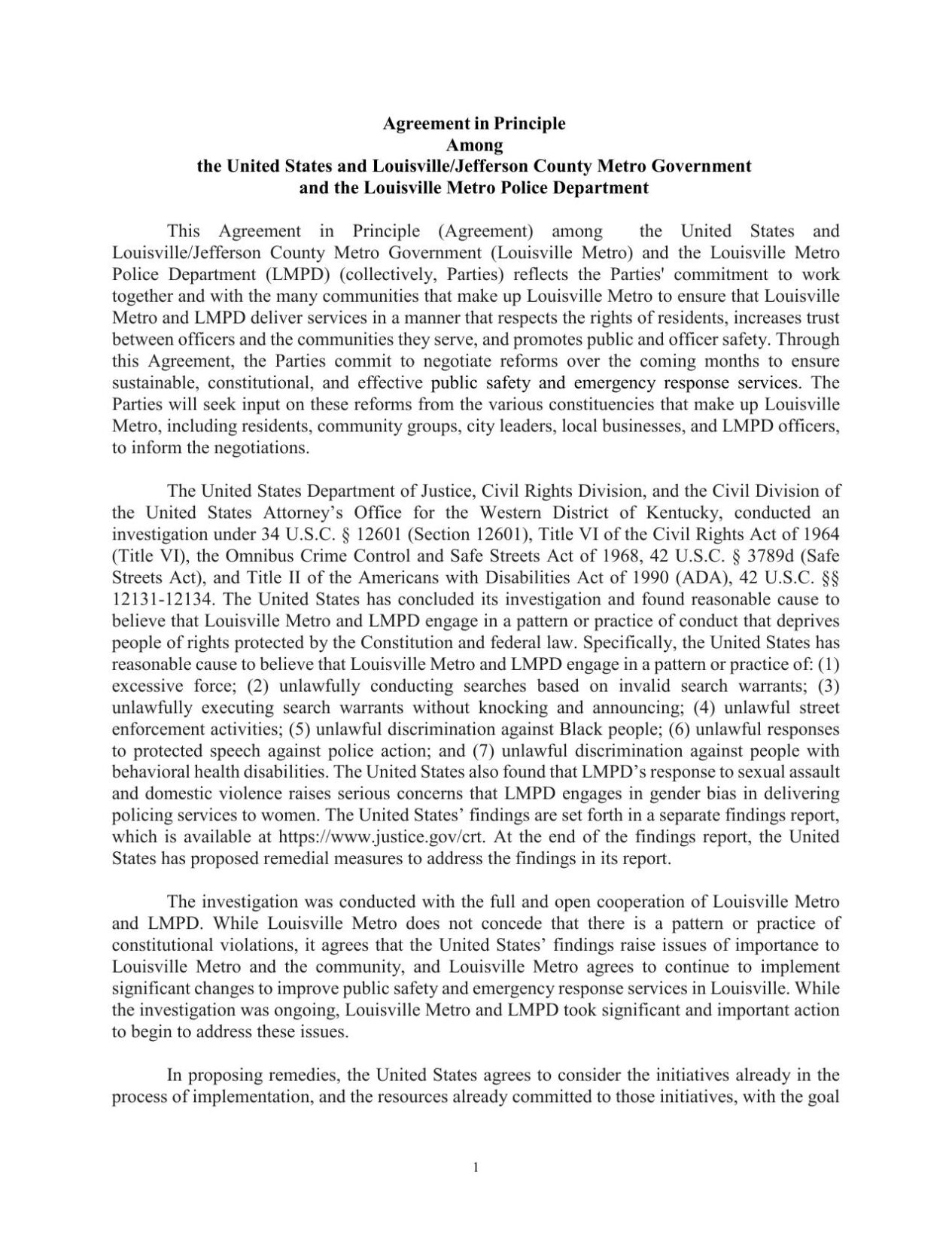LOUISVILLE, Ky. (WDRB) -- Federal investigators strongly rebuked the actions of Louisville police Wednesday, saying they believe the department and Metro government for years engaged in practices that violated the U.S. Constitution and federal law, including excessive use of force and searches based on invalid search warrants.
The Department of Justice announced the findings of a wide-ranging civil rights review in Louisville that began nearly two years ago in the wake of the 2020 police killing of Breonna Taylor.
Speaking at Metro Hall, U.S. Attorney General Merrick Garland said federal and local officials have agreed in principle to enter a court-enforceable consent decree as the department makes agreed-upon changes to policing practices.
Metro government would pay $8 million to $10 million annually in reform-related costs, according to figures a consultant presented to Metro Council in 2021.
Garland listed myriad examples of Louisville police misconduct and crimes, such as throwing drinks at pedestrians, racial disparities in arrests and traffic stops, assaulting citizens with disabilities and calling Black people "monkeys, animal and boy."
"This conduct is unacceptable," Garland said. "It is heartbreaking. ... It is an affront to the people of Louisville who deserve better."
He said Metro government and LMPD have failed to ensure that all employees uphold the constitutional and legal rights of Louisvillians, and failed to provide officers and other workers with the support and resources to do their jobs effectively and legally.
"LMPD's conduct has undermined its public safety mission and strained its relationship with the community it's meant to protect and serve," Garland said.
Assistant Attorney General Kristen Clarke said the police department "discriminated against Black people through unjustified stops, searches and arrests. The police used excessive force subjecting people to unlawful strikes, tasings and K-9 bites.
"The police sought search warrants without justification and carried out no-knock warrants unlawfully, evading the Constitution, defying federal law and putting ordinary citizens in harm's way. Today marks a new day and a new chapter for the people of Louisville."
The Justice Department recommends 36 new steps for LMPD to take. Those are a "starting framework" for changes meant to build community trust and follow federal law and the Constitution, Garland said.
Many of those involve better training and policies. They include changing department policy to emphasize de-escalation techniques and requiring officers to weigh other alternatives before using force; creating "clear policies" on the use of informants and routinely evaluating those sources' credibility; requiring "close and effective supervision" of all street enforcement, including traffic and pedestrian stops; and collecting data on those stops, including ones that don't result in citations or arrests.
The federal investigative report contains "infuriating examples of abuse," especially against minorities and women and children, Louisville Mayor Craig Greenberg said.
In one example, an officer acknowledged he "beat the sh**" out of an intoxicated woman with a flashlight for trying to bite his shoe while he had her pinned to the ground with his foot on her chest.
"He said that he did not even know how many times he hit her in the face," according to the report. His supervisor laughed at the incident and did not turn it over for an internal investigation.
The mayor acknowledged that some Louisvillians will view the report as confirmation of their own interactions with police and cautioned against others minimizing it as "politics" or containing examples to be found in any city.
"This report paints a painful picture of LMPD's past, but it helps point us in the right direction for our future," Greenberg said.
Former Mayor Greg Fischer said in a statement that today is "another important inflection point to honor the pain of 2020 by further acknowledging - and continuing to act on - the fact that our community deserves a new era of public safety."
Gov. Andy Beshear said his office would be reviewing the recommendations and helping to make changes in LMPD as well as law enforcement departments across the state.
"The finds are serious and ougt to be taken seriously," he told reporters. "... Now I know that law enforcement knows that I support them, but at the same time, we can always take a look at how we can do a better job. Especially if there are communities that feel they are not being served or feel less safe. Working to make sure we understand those concerns and address them, it's just the right thing to do."
In a statement, the River City Fraternal Order of Police said it feels "very strongly" that the report is "an unfair assessment of the great work that is accomplished daily by the vast majority of LMPD officers" and that the report "should not go unchallenged and should be dissected for evidentiary value."
"Unfortunately, no law enforcement agency is without flaws. There have been instances where officers have acted in a manner that is not consistent with the values, ethics, and morals of good policing. Some of those instances have been referenced in the DOJ report," the statement continued. "However, there are protocols in place to address those transgressions and officers have been held accountable. The FOP supports holding police officers accountable for their actions. Officers, like all citizens, also have a right to due process and the FOP is here to ensure that right is afforded to our members."
Investigators singled out Steve Conrad, who served as police chief in the Fischer administration, for failing in "multiple cases" to launch investigations into possible officer misconduct -- even though citizens already had complained.
Instead, the report said, Conrad waited until those cases received media scrutiny to initiate internal reviews.
There are 18,000 law enforcement agencies in the United State, according to the DOJ, and in the last 25 years, fewer than 100 have been placed under a consent decree.
Fischer fired Conrad after learning that officers weren't using body cameras during the fatal shooting of business owner David McAtee during the 2020 protests that erupted over Taylor's death months earlier.
Federal investigators also criticized the former chief for failing to analyze the work of the Ninth Mobile Division, which was focused on high-crime neighborhoods, for "signs of discrimination."
Conrad did not answer his cell phone Wednesday — his voicemail hasn't been set up — or immediately respond to a text message.
But Metro Council member Anthony Piagentini said it's "disgusting" that neither Fischer nor Conrad was held accountable in the federal report.
"Who's holding the mayor accountable who created the circumstances of which this department has now been indicted? Who's holding the chief accountable for his role in what happened here?" Piagentini told WDRB News.
He said "it's disgusting that individual people and the citizens of this community have suffered from a poorly-led police department, that the two people that were the most responsible that are just riding off into the sunset collecting their pensions and nothing's going to happen to them."
In the coming months, federal and local officials will negotiate terms of a consent decree to be filed in federal court, said Associate U.S. Attorney Vanita Gupta.
"We will soon be meeting with and reaching out to community members and law enforcement to hear your ideas about the kind of police department and policing you want to see in your community," she said.
Jefferson County Attorney Mike O'Connell said "any negotiated agreement reached would be entered as a consent decree with the federal court here in Louisville.
"We look forward to working with the DOJ to negotiate an appropriate consent decree to improve policing in Louisville," he said in a statement. "We recognize that consent decree negotiations have often taken longer than 6 months in other jurisdictions, and we look forward to negotiating collaboratively with DOJ toward timely initiatives to help the Louisville community.”
Gupta said the consent decree in Louisville will seek to apply lessons learned in other cities that have entered into similar pacts. She cited Seattle, for example, where use of serious force declined by 60% since 2014, and Albuquerque, New Mexico, where serious uses of force has dropped by one-third in recent years.
Among other things, the Justice Department probe also aimed to determine if the Louisville department made stops, searches and seizures on patrols and when executing search warrants at private homes that violate Fourth Amendment protections.
It found that LMPD "routinely seeks search warrants for residences without establishing legal justification for invading someone's home," said Clarke, of the Justice Department's civil rights division.
"Officers regularly seek warrants that are overly broad, sweeping in people who have at most a remote connection to the investigation, who have committed no crime, harbor no evidence and have a constitutional right to be not be subjected to unreasonable search and seizure," she said.
The Justice Department determined that warrant applications submitted by officers routinely failed to show probable cause as a result of "poor supervision and oversight."
Investigators also believe police executed warrants without knocking and announcing their presence when the practice of "no-knock" warrants was permitted.
The report found that only 10% of warrants served on Louisville residences included in a sample were captured on body camera, even though the officer-worn technology was widely available.
Investigators then reviewed video of warrants served from January 2016 through October 2021, finding that only 2.5% of those cases involved no-knock warrants.
However, the report found that officers did not knock and announce their presence in more than half of the warrants served.
Clarke said investigators spoke with a number of public and private leaders and officials, including judges and attorneys, advocacy groups, religious leaders and residents "from different walks of life." The review included thousands of documents governing LMPD enforcement activities, along with thousands of hours of body camera footage, she said.
The Justice Department investigation began about a year after Louisville police became the focus of national scrutiny and criticism due to the killing of Taylor.
Police were looking for money or drugs connected with Jamarcus Glover, who was at the center of a narcotics probe by Louisville police. The warrant for Taylor's home was executed around the same time that police served other warrants on suspected drug houses in the city's west end, some 10 miles away.
Kenneth Walker was dating Taylor and was with her after midnight on March 13, 2020, when police raided her apartment on Springfield Drive near Pleasure Ridge Park. Walker, a licensed gun owner, told police he fired one shot when he believed intruders had burst into the home. Former Sgt. Jonathan Mattingly was shot once in the leg.
Police responded with 32 shots, hitting Taylor six times. The 26-year-old died at the scene.
No drugs were found in her home.
Attorney Ben Crump, one of the lawyers representing Taylor's family, said Wednesday he was "encouraged by the findings" revealing a "pattern of biased policing and a long list of constitutional violations by the Louisville Metro Police Department."
Crump said the findings and remedial measures "will help protect the citizens of Louisville and shape its culture of policing. It’s steps like these, and involvement of the Attorney General and the DOJ’s Civil Rights Division, that will move our nation forward and prevent future tragedies like the one that took the life of Breonna Taylor and the countless others who have been killed unnecessarily by law enforcement.”
The Justice Department charged four former Louisville police officers with federal crimes in connection with the fatal raid.
Metro government paid $12 million to Taylor's family and implemented numerous reforms in the police department to settle a wrongful death lawsuit.
And in just the last five years or so, the city has paid more than $40 million to settle dozens of lawsuits accusing the city’s police department of complaints ranging from wrongful arrests to drivers who were stopped and searched illegally.
The total since 2017 dwarfs what neighboring states and other larger cities have paid for police mistakes in recent years, a WDRB News investigation found.
LMPD has been sued several times for traffic stops claiming racial bias by officers, including the 2018 viral stop of then 18-year-old Tae-Ahn Lea. Lea, who is Black, was removed from his car and handcuffed for about 20 minutes after police pulled him over for making a wide turn. A lawsuit filed Lea's behalf is pending.
Garland said police have "relied heavily on pretextual traffic stops in Black neighborhoods," pulling citizens over for minor traffic offenses in order to investigate for other crimes.
At the same time, several former Louisville police officers have been federally charged and convicted.
Katie Crews pleaded guilty in October to using excessive force the night restaurant owner McAtee was killed in 2020 during the first weekend of protests over Taylor's death.
Crews admitted she used "unreasonable force" by shooting pepper balls at McAtee's niece, Machelle McAtee on June 1, 2020, striking her once in the shoulder, as the woman was standing on private property and not a threat to officers.
Former Louisville Metro Police Officer Cory Evans pleaded guilty to using excessive force when he hit a kneeling protester in the back of the head with a riot stick in May 2020.
Clarke said the investigation found LMPD often responds "aggressively to people criticizing police," both before and after the 2020 protests.
And she said police used "unnecessarily aggressive behavior" against people experiencing behavioral health crisis," including one man who had 25 encounters with officers in less than two years.
"In some of these interactions, LMPD officers needlessly escalated the situation and used unreasonable force," Clarke said. "At times they even mocked him. The man ultimately died in a Louisville Metro detention center after he once again was arrested by LMPD."
Asked whether any officers whose actions are cited in the report will face disciplinary or legal action, Greenberg said his administration will review each of those cases.
"Some of these incidents have already been reported and are known and have gone through an investigation process," he said. "Others may not have, and we will be looking at each one of those incidents as we review the findings report and the incidents they cite in further detail."
Copyright 2023 WDRB Media. All Rights Reserved.
